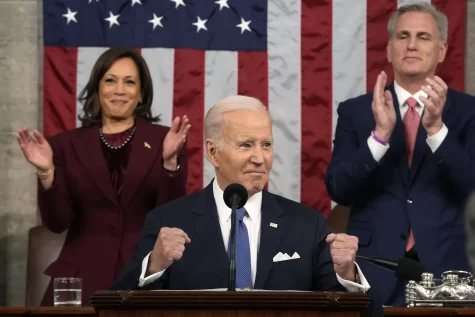“Hot for Teacher” lawsuit doesn’t hold up in court
Former student Joseph Corlett, the 57-year-old who sued the university over his suspension for inappropriate class writings, had his case thrown out of federal court last month.
U. S. District Judge Patrick Duggan, in an opinion accompanying the July 23 dismissal, said Corlett’s speech, while possibly protected in other settings, had no place in an academic environment.
“When Plaintiff referred to his Oakland University English professor as ‘stacked’ and graphically compared her to a sitcom character he fetishized in a writing assignment, he brought a pig into the parlor,” wrote Duggan.
Corlett wrote a two-part journal entry entitled “Hot for Teacher” in which he discussed his attraction to a former OU female professor who was teaching his Advanced Critical Writing course.
“Kee-Rist, I’ll never learn a thing,” he writes in one entry. “Tall, blond, stacked, skirt, heels, fingernails, smart, articulate, smile. I’m toast but I stay.”
When Corlett turned it into the professor for grading, she turned it over to the Dean’s office and the student judicial process followed.
A Reason to Proceed
The case, filed March 15, was Corlett’s response to Oakland University suspending him for three semesters beginning winter 2012 for being in violation of university regulation 6.02, “Unlawful Individual Activities.” Regulation 6.02 reads in part:“… nor shall any person in any way intimidate, harass, threaten or assault any person engaged in lawful activities on campus.”
Corlett said it isn’t over.
“My team and I are assessing the situation,” he said. “I have no regrets. The corpulent woman has not harmonically vocalized.”
Glenn McIntosh, Vice President of Student Affairs and Enrollment, formerly Dean of Students, declined to comment, citing Corlett’s rights under the student judicial process.
Drawing Parallels
The Oakland Post contacted numerous parties involved with the case at OU. All either declined comment or failed to return phone calls.
Corlett’s case had two basic premises: his freedom of speech had been violated and that university regulation 6.02 was unconstitutional.
Taking up the First Amendment question, Duggan quoted a 1995 decision in Settle v. Dickson County School Board.
“ Students do not lose entirely their right to express themselves as individuals in the classroom, but federal courts should exercise particular restraint in classroom conflicts between student and teacher over matters falling within the ordinary authority of the teacher over curriculum and course content…. The free speech rights of students in the classroom must be limited because effective education depends not only on controlling boisterous conduct, but also on maintaining the focus of the class on the assignment in question.”
Crossing the Line
Devin Schindler, a professor of constitutional law at Thomas M Cooley Law School, agreed with Duggan’s assessment. “ In this context where you have a specific assignment and the assignment has certain parameters and certain rules and the goal of the assignment is not one of expression but rather learning how to write, I believe that (OU) was within its rights,” Schindler said.
Duggan went on to further state that Corlett’s physical description of the professor did not fall under protection of the First Amendment.
He quoted the Seventh Circuit decision in Brandt v. Board Of Education of City of Chicago. “Self-expression is not to be equated to the expression of ideas or opinions and thus to participation in the intellectual marketplace.”
Schindler said that although the penalty for inappropriate speech or failing to meet the conditions of the assignment is usually a zero grade, the penalty imposed by OU is not unheard of.
“If the speech is so far beyond the pale to constitute what is essentially sexual harassment, the school is also within its rights to take further action above failing the student, which is exactly what they did here,” he said.











